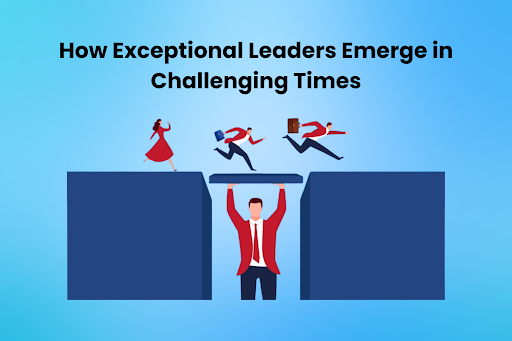At work, being a leader is an art form more than just a job description. Great leaders don’t just happen; they must work at it, developing their abilities and fortitude through difficult circumstances. In this blog, we will go through various topics, including Leadership Certification, the essence of What is Leadership, and how real leaders rise to the challenge of guiding their teams through difficult situations.
Table of Contents
- The Importance of Leadership Certification
- What is Leadership?
- Adaptability
- Empathy
- Strategic Mindset
- Effective Communication
- Inclusive Leadership
- How Challenges Forge Exceptional Leaders
- Resilience
- Innovation
- Leading by Example
- Integrity
- Authenticity
- Strategies for Leadership Development
- Mentorship Programs
- Continuous Learning Initiatives
- Conclusion
The Importance of Leadership Certification
Although a leadership certification is frequently regarded as a badge of honour, its importance goes far beyond a formal credential. It is evidence of a person’s dedication to development, lifelong learning, and the pursuit of excellence. Proven leaders recognise that credentials are a tool to help them prepare for uncertain situations rather than a goal for themselves. This is especially true during difficult times.
A leader’s level of understanding and readiness is made abundantly clear during a crisis. A leadership certification serves as a compass, assisting leaders in navigating unfamiliar terrain and providing knowledge on managing crises effectively, making strategic decisions, and building resilience in their teams.
What is Leadership?
Being a leader is more than just having a title or a job; it’s about living up to your vision, beliefs, and capacity to motivate others. The genuine essence of leadership emerges during difficult times. It goes beyond what is typically expected, requiring flexibility, compassion, and strategic thinking.
Adaptability
Outstanding leaders are exceptionally adaptable in the face of shifting conditions. Instead of seeing obstacles, they see chances for development and creativity. When pursued sincerely, a leadership credential instils in people the mindset of constant adaptation. When navigating through uncertainty, this characteristic becomes crucial as leaders skilfully modify their approaches to suit the changing needs of their teams and organisations.
Empathy
When things become dark, empathy comes in handy. Great leaders are aware of their stakeholders’ and teams’ emotional states. Acquiring a leadership credential frequently entails learning emotional intelligence, a quality that allows leaders to engage with their teams more deeply. The capacity for empathy builds unity and trust in trying circumstances, forming a solid group that can withstand any adversity.
Strategic Mindset
Without a strategic vision, what is leadership? Proficient leaders have an acute awareness of the broader context. They take a proactive rather than merely reactive stance. A leadership certification helps leaders develop their strategic thinking skills by equipping them with the knowledge and abilities to foresee obstacles and create well-thought-out plans. This strategic foresight becomes a compass in trying times, allowing leaders to steer clear of trouble and toward success.
Effective Communication
Effective communication fosters unity and understanding in leadership. Great leaders are skilled communicators who can easily articulate their vision and objectives to their people. The significance of concise and clear communication is frequently emphasised in leadership certification programs, which train leaders to express their expectations and ideas in an understandable way to various audiences. Effective communication gives the team direction and purpose during trying times, acting as a lifeline.
Inclusive Leadership
Genuine leadership transcends personal achievements and involves fostering an inclusive atmosphere that encourages the growth of varied viewpoints. Great leaders embrace diversity because they understand the power of many perspectives. A thorough leadership certification teaches leaders how important it is to promote diversity and teamwork in their organisations. During difficult periods, inclusive leadership can be a valuable asset as groups utilise diverse perspectives and backgrounds to effectively handle intricate situations.
How Challenges Forge Exceptional Leaders
Difficult times serve as a furnace that divides managers from leaders. When faced with difficulty, extraordinary leaders show their true colours. As leaders navigate through uncertainty and demonstrate their capacity to lead by example, the abilities they have gained via leadership certification come into play.
Resilience
Not only is resilience a trendy term, but it’s a characteristic of great leaders. Gaining a leadership credential frequently entails overcoming obstacles and failures and preparing candidates to deal with the unpredictability of the workplace. Leaders rely on this resilience during crises to motivate their teams to keep going when things get tough.
Innovation
Innovative solutions are needed in trying times, and great leaders know this. A leadership credential gives leaders the knowledge and skills to cultivate an innovative team culture. Leaders foster innovative approaches to problem-solving during uncertain times, transforming obstacles into chances for development and progress.
Leading by Example
Great leaders set an example for others rather than just assigning responsibilities. Leaders’ impact is ingrained in their deeds and goes well beyond what they say. This idea is reaffirmed by leadership certification, highlighting the value of sincerity and authenticity in leadership.
Integrity
Trust becomes a rare commodity during difficult times. Integrity is the cornerstone of exceptional leadership, allowing them to manoeuvre through uncertainty while maintaining their people’s trust. A leadership certification establishes an environment of trust and openness inside an organisation by attesting to a person’s dedication to moral leadership.
Authenticity
Teams respond well to authentic leaders. Obtaining a leadership certification frequently requires leaders to engage in introspection, which aids in discovering and accepting their true selves. Authenticity becomes a source of motivation during difficult times, helping teams feel united and purposeful.
Strategies for Leadership Development
Development in leadership is an ongoing process. During difficult times, exceptional leaders arise and help shape the next generation of leaders. Let’s explore how organisations may foster a culture that develops tomorrow’s leaders as we dive into effective tactics for leadership development.
Mentorship Programs
The foundation of leadership development is mentoring. Seasoned leaders can mentor and uplift the following generation using their extensive knowledge. As part of their leadership development plan, organisations can put mentorship programs into place, facilitating meaningful interactions between upcoming talent and experienced leaders and providing a forum for knowledge exchange. The knowledge gained from mentoring serves as a beacon during difficult times, guiding leaders facing previously unheard-of difficulties.
Continuous Learning Initiatives
The journey of leadership is dynamic, and learning never ends. Continuous learning programs are embraced by organisations that are dedicated to developing their leaders. This entails giving leaders access to materials, seminars, and training programs that keep them informed about market developments and provide them with the tools they need to successfully negotiate the intricacies of today’s workplace. Leaders who practice continuous learning are resilient during difficult times because they have the knowledge and flexibility to go beyond unforeseen challenges.
Conclusion
Outstanding leaders are still emerging professionally; dedication to development, resiliency, and sincerity characterises their path. A leadership certification acts as a compass, helping people navigate the difficulties of leadership, particularly during trying times. When we consider what leadership is, we realise that it is a never-ending process of self-improvement and self-discovery rather than a destination.
Great leaders rise to the occasion during a crisis using their flexibility, compassion, and strategic thinking. Leaders with a knack for invention and unflinching resilience are forged in the furnace of difficulties. These leaders foster team unity and trust by setting a good example and using honesty and integrity as guiding values.
Let’s embrace the characteristics of great leaders as we make our way through the workplace, understanding that achieving leadership greatness is a continuous process that is impacted by the obstacles we encounter and the lessons we pick up along the way. For more information visit: The Knowledge Academy.










